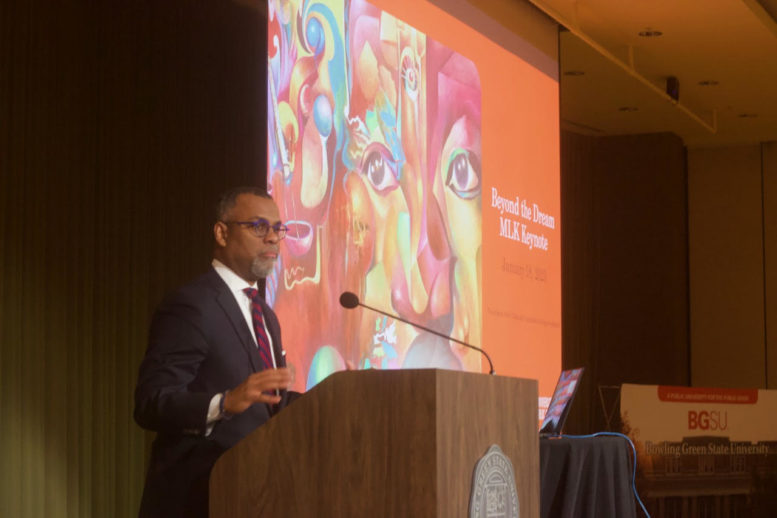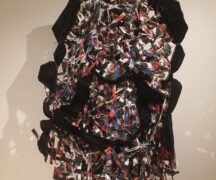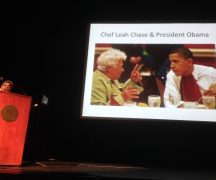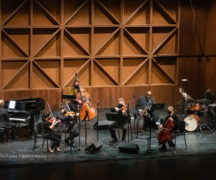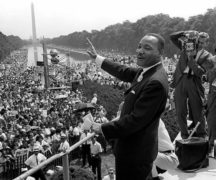By DAVID DUPONT
BG Independent News
The image of Martin Luther King Jr. that’s most beloved and ubiquitous shows him in 1963 delivering his “I Have a Dream Speech.”
“We like to think of him,” Eddie Glaude Jr. told an audience Wednesday night at BGSU, “on the steps of the Lincoln Memorial hands outstretch, shouting: ‘Free at last! Free at last! Thank God Almighty, we are free at last!’”
As reassuring as that image is, Glaude said, “it is a fairy tale,” another manifestation of Americans’ desire for narratives with happy endings.
But Dr. King’s story, Glaude said, is not resolved, and the nation is still grappling with the same problems the civil rights leader grappled with.
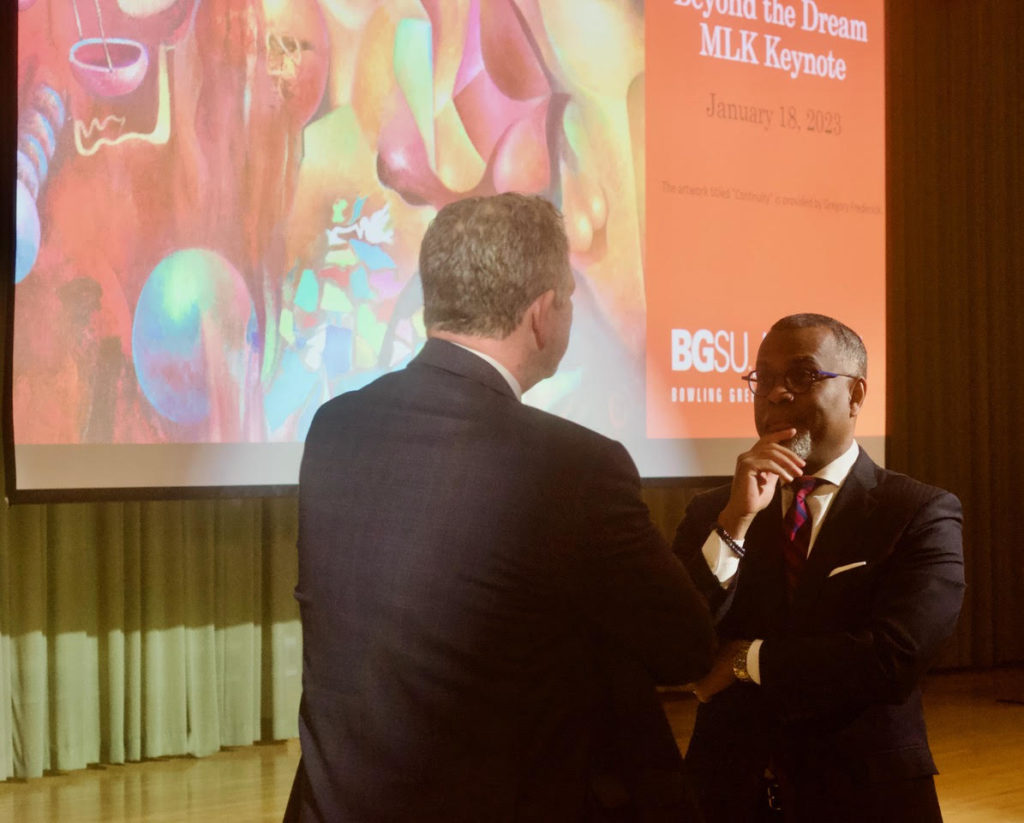
Glaude, a scholar, public intellectual, and frequent guest on MSNBC, came to Bowling Green as the “Beyond the Dream” speaker.
His speech was equal parts sermon and scholarly dissertation that shed light on the darkness in the American soul. He took the audience on a journey through other King speeches, starting 1962 the year before the March on Washington.
At a conference in Nashville on the ethics of integration, King differentiated between desegregation and integration. The fight to break down legal racial barriers was underway, and as important as it was, it was not sufficient.
“Desegregation was a negative formulation,” Glaude said. Even if totally achieved, Dr. King asserted, it would lead to “physical desegregation but spiritual segregation. … Physical proximity without spiritual affinity.”
Glaude continued: “We remain walking mysteries to each other.”
This contrasts with the intimacy that allows those who knew who killed Emmett Till not to hold them accountable. “They drank beer with them,” he said. “They played checkers with them.” In those “intimate spaces “ hatred, fear, and grievance fester.
Despite legal triumphs, the nation remained in this moral quagmire informed by a national hubris that keeps it from facing reality.
By the last year of his life, many young activists were taking a different path. They were espousing Black Power and were willing “to fight back violently.” This came at the same time as “a rising tide of white resentment.”
Dr. King “was not celebrated,” Glaude said. In the year he died, “72 percent of the nation reviled him.”
In early 1968, King gave a speech at Carnegie Hall in an event honoring the Black scholar and activist W.E.B. Du Bois. The focus was on Du Bois’ response to the image of Reconstruction promulgated by the Dunning School which asserted that the freed, former slaves in the South were “wanton” and “ignorant” and not ready for citizenship. Reconstruction, in their eyes, was a mistake and failure.
As King saw it, Black people were “partially liberated” and then enslaved again by Jim Crow.
But Stanley Levinson, a friend and close advisor to King, said he’d never heard King read a speech so poorly. It reflected King’s depression, which dogged him throughout these years.
During the question-and-answer session, Glaude told a story of King so distraught over the savage beatings of two Black middle-school students in Mississippi that he was unable to get out of bed until Joan Baez came and sang a spiritual to him.
On the eve of his assassination, on “a stormy night when he did not want to get out of bed,” King rose to deliver his prophetic “Mountaintop” speech.
“I don’t know what will happen to me now,” he told those gathered in Memphis where he was supporting striking garbage collectors. He had been to the mountaintop. “And I’ve seen the promised land. I may not get there with you. But I want you to know tonight, that we, as a people, will get to the promised land.”
But as Glaude reminded the BGSU audience, that has not yet come to pass as much as we wish it has.
“All too often … we rush to celebrate the life like Christians who rush past the darkness of Saturday in order to bask in the light of resurrection Sunday,” he said.
People forget about King’s warning about “difficult days ahead,” Glaude said. “Since his death in 1968 America has repeatedly turned its back on what Dr. King died for.”
In 2023, America is still fighting the same battles over voting rights and poverty.
“We’re still fighting over the story we tell ourselves, over who we are,” Glaude said. “It’s 2023, and I’m still arguing that I belong here, that I’m not an object your charity that equality is not your possession to give to anyone.”
Americans have failed to confront how difficult it is to heal. “However shocking it is, to heal we have got to face the fact America is a racist country. We have got to face the fact that racism still occupies the throne of our nation. I don’t think we will ultimately solve the problem of racial justice until this is recognized and until this is worked on.”
This means “every human being has dignity.”
Instead, those Americans will revel in celebrations of Dr. King. “We prefer our illusions straight no chaser,” Glaude said.
“Our task on this day is not to simply lift up the symbol of Dr. King and pat ourselves on the back for doing so. Our task is to fully understand the fullness of his life’s message,” he said.
“A nation that continues to lie to itself can never know truly what it is,” he continued. “We are a racist country and to admit such a thing is not to condemn us to the gallows. It’s no different than admitting you’re a sinner. That admission is the precondition to be born again, a new way to be in the world free of this insidious notion that some people, because of the color of their skin, are better than others.”
To do this, Glaude said. “We would have to shatter the myth and shatter the lies that give us comfort and look ourselves in the mirror and see who is looking back at us. The masks have been ripped off. We must face the reality of who we can be and the past that made us who we currently are.”
He continues to have hope. As James Baldwin said: “Hope is invented every day.”
Glaude said: “We can build a truly integrated society both in policy and in personal engagement. If we do not imagine America anew this fabulous experiment will fail. … Democracy must be secured by us … for all of us. And if we are going to be different, if we’re all going to be born again, we must finally redeem the idol of race. Let’s begin again today.”
(Correction: Mr. Glaude’s name was misspelled in an earlier version of the story.)

